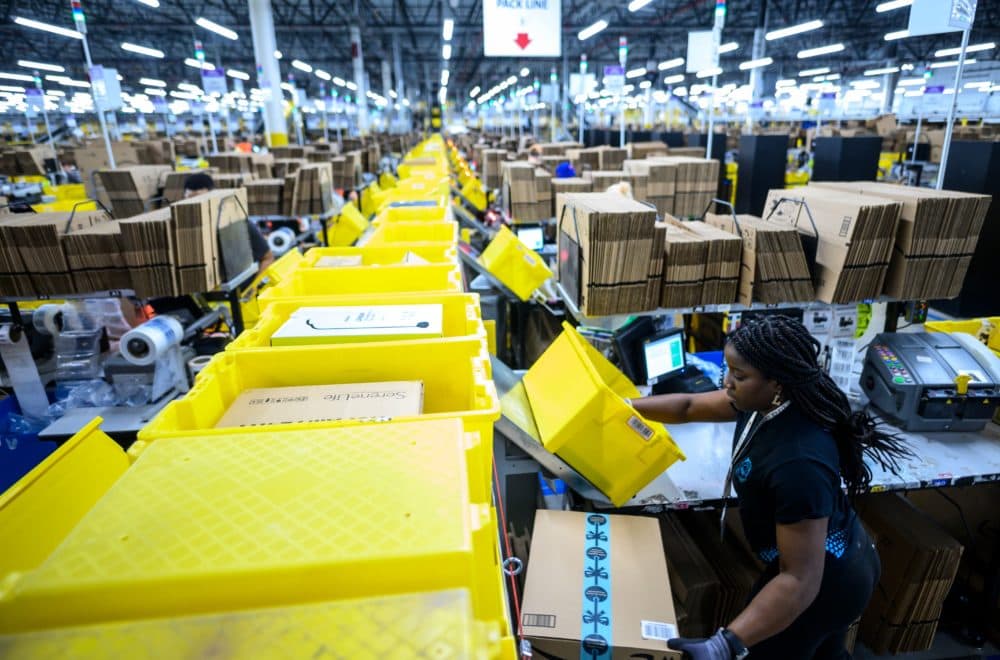Advertisement
One Amazon Warehouse Worker In Alabama Has 'No Doubt' Her Coworkers Will Vote To Unionize

Amazon employees in Alabama began voting this week on whether they want to form the first union of Amazon warehouse workers in the U.S.
Past efforts at organizing Amazon warehouse workers have failed, but workers in Bessemer, Alabama, think this time will be different, despite efforts by the company to dissuade them from voting to join the union.
Jennifer Bates, an employee at the Bessemer Amazon facility who has been helping organize the union drive, says unionizing will help warehouse workers advocate for better pay and benefits, and it will give them “an opportunity to speak” directly to and be heard by management.
There are about 6,000 full-time workers at this 1-year-old fulfillment center and additional seasonal workers. Bates says a lot of her coworkers are “very excited” about unionizing because their complaints have been ignored for so long. Some people even ended up quitting because they were in so much physical pain from working long 10-hour shifts with two 30-minute breaks.
Sometimes their managers will force them to work overtime without an extra break, she says. The rules change every day.
“You can tell that the people are tired,” she says, “that they're slow walking out or either limping walking out, and for the pay that we're receiving for the workload, it doesn't balance out.”
Bates says she doesn’t know if Amazon’s practices violate labor laws, but what she does know is “that the workload is too much on the human body.”
Workers at the giant Bessemer facility are required to walk up and down flights of stairs and lug heavy boxes off of trucks, she says. By the time they cross the facility and go downstairs to reach the break room, workers have barely had much time to rest before their 30 minutes is up.
“Some of the boxes are really heavy, so it's a lot of walking and standing, walking and standing [at] this fast pace,” she says.
Amazon workers at the Bessemer facility are voting to be a part of the Retail, Wholesale and Department Store Union [RWDSU]. President Stuart Appelbaum told Here & Now last month that the Bessemer workers’ experiences are similar to what other Amazon employees at fulfillment centers have faced.
Advertisement
“I believe the workers at the facility in Bessemer, Alabama, were experiencing what Amazon workers all over the world have been experiencing, and that has been a disrespect for them as workers, as people who make Amazon profitable,” he says. “They want to know that their health and safety is going to be respected, that they're going to be treated as human beings.”
Part of the reason why it’s been so difficult for Amazon workers to unionize is because they fear retaliation from the company, Appelbaum says.
“People are afraid of Amazon,” he says. “Even if Amazon says it's not pressuring people, it's creating the impression that people should be afraid.”
Amazon has tried to stop the organizing efforts in Bessemer. The company has brought in a union-busting law firm and posted signs around the facility discouraging workers from unionizing, Appelbaum says. Workers were told that joining the union will cost them money for little benefit, Appelbaum and Bates say, even though Alabama is a right-to-work state, which means workers can opt out of the union if they choose.
"We don’t believe the RWDSU represents the majority of our employees’ views,” Amazon spokesperson Heather Knox told Here & Now in a statement. “Our employees choose to work at Amazon because we offer some of the best jobs available everywhere we hire, and we encourage anyone to compare our total compensation package, health benefits, and workplace environment to any other company with similar jobs."
Bates says there is strong support for the union, especially from younger workers who she says have talked to their parents about the benefits of joining. Appelbaum says that’s likely due to Bessemer’s history as “a strong union town.”
“Decades ago, that's where the steel mills were located,” he says. “People could speak to their parents or grandparents and hear about the difference unions made in their lives.”
Race is also playing a key role in this union drive. Many of the employees at this warehouse are Black, and union organizers are building their campaign around Black Lives Matter, Appelbaum says.
“It's time for these workers to be treated with respect,” he says. “We see this as both a labor struggle and as a civil rights struggle, which has often been the story of the labor movement in the South.”
Despite the backlash from management, Bates says she’s confident that this time Amazon workers will form a union.
“I believe it with all my heart,” she says. “I have no doubt that we'll be successful.”
Read the full statement from Amazon on the Bessemer, Alabama, facility, from Heather Knox:
"We opened this site in March and since that time have created more than 5,000 full-time jobs in Bessemer, with starting pay of $15.30 per hour, including full healthcare, vision and dental insurance, 50% 401(K) match from the first day on the job in safe, innovative, inclusive environments, with training, continuing education, and long-term career growth. We work hard to support our teams and more than 90% of associates at our Bessemer site say they would recommend Amazon as a good place to work to their friends.
"We don’t believe the RWDSU represents the majority of our employees’ views. Our employees choose to work at Amazon because we offer some of the best jobs available everywhere we hire, and we encourage anyone to compare our total compensation package, health benefits, and workplace environment to any other company with similar jobs."
Chris Bentley produced and edited this interview for broadcast with Tinku Ray. Samantha Raphelson adapted it for the web.
This segment aired on February 11, 2021.

